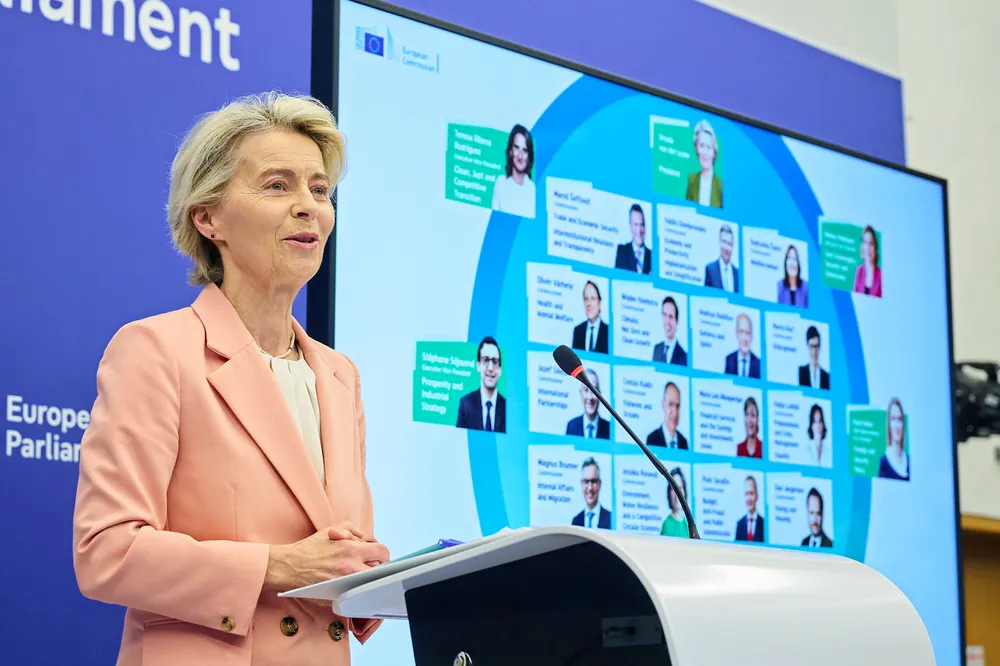Renewable energy backers picked for key EU Commission posts despite shift to right
ANALYSIS | Against background of political shift, EU Commission president picks Spanish and Danish climate and energy veterans for key positions

The EU has moved to the right, and so has the European Commission.
The commission’s core priorities or overarching topics are “prosperity, security and democracy”, von der Leyen said when presenting her ‘college’ of commissioners-designate on Tuesday, adding in Brussels speak: “This all happens against a backdrop of competitiveness for the twin transitions of the decarbonisation and the digitalisation of our economies.”
Displaying her finely-honed political instincts and eager not to snub the third-biggest EU economy, Italy, and its Prime Minister Giorgia Meloni (with whom von der Leyen is said to get along very well), she has even proposed a member of Meloni’s post-fascist Brothers of Italy party as an executive vice-president with an economic and finance portfolio.
In the energy and climate areas, von der Leyen’s picks are welcome and well-known faces, which could appease the Greens and Social Democrats in the European Parliament and among member states’ governments such as Germany or Spain.
“Both have championed renewables in their home countries and overseas for many years. Both know what’s needed to deliver the energy transition on grids, permitting, electrification and supply chains,” WindEurope CEO Giles Dickson said regarding the appointments.
Wind features quite prominently in the policy priorities of defence and security as well as the competitiveness of the EU economy, Dickson added during a joint podcast on the incoming EU Commission with WindEurope policy director Pierre Tardieu.
It should, “because wind can contribute to a stable and competitive energy supply”, Tardieu said, adding that the recent report by former European Central Bank President Mario Draghi on Europe’s competitiveness (or lack thereof) covered many aspects related to that.
“Investment signals, the importance of accelerating permitting, the importance of investing in cross-border infrastructure and grids more broadly. Hopefully, we can build on that for the next few years,” Tardieu said.
Dickson added that defence and security includes the security of energy infrastructure.
“Nato is now very active on protecting offshore energy infrastructure. So, wind features in that agenda as well,” he concluded.
SolarPower Europe CEO Walburga Hemetsberger said von der Leyen has proposed a strong team around the delivery of a Green Deal that strengthens EU competitiveness, and observed that commissioner-designate Jørgensen’s portfolio combining energy and housing “makes perfect sense”.
“Addressing energy poverty and delivering affordable housing goes hand-in-hand. Solar on social housing, for example, is low-hanging fruit to decarbonise our grid and ensure no one is left behind.”
Hemetsberger also said she was “thrilled” to see a reference to an electrification action plan in the so-called mission letter of von der Leyen to Jørgensen.
“Together with the emphasis on renewables, energy storage, and energy system integration – including flexibility – the letter sets a solid foundation to build an electrified, competitive Europe.
“Flexible, renewable electrification can cut day-ahead power prices by 25% by 2030 and 33% by 2040. The next Commission must be focussed on implementing and financing the solid 2030 frameworks set by the previous mandate, and land on ambitious goals for 2040.”
The proposed EU commissioners now will be scrutinised by the European Parliament. If approved, they will take office in December.
(Copyright)